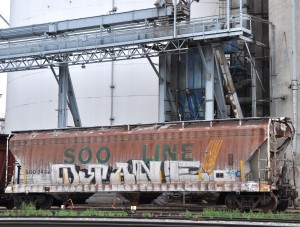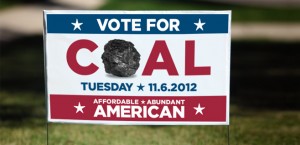
Singer-songwriter John Prine turned 66 today, Oct. 10. ‘Happy Birthday!’ to one of the best there is.
I was surprised when WUMB’s Perry Persoff saluted Prine this morning. Since last evening, I’d had his ‘Paradise’ (1971) rolling about my brain – not for the first time.
‘Paradise’ is the best song about strip mining ever written, though Deborah Silverstein’s ‘Draglines’[1] comes in a very close second. Here is the first verse and chorus as they appear on Prine’s website:
When I was a child my family would travel
Down to Western Kentucky where my parents were born
And there’s a backwards old town that’s often remembered
So many times that my memories are worn.
And daddy won’t you take me back to Muhlenberg County
Down by the Green River where Paradise lay
Well, I’m sorry my son, but you’re too late in asking
Mister Peabody’s coal train has hauled it away.
That’s about as good a setup as any story can have for a man’s recollection of a happy landscape despoiled. The words, the thoughts seem simple, direct.
And they are, until you learn, as I did years after I first heard them, the capitalisation of ‘Paradise’ was proper: Paradise was the town’s name.
Then, the How Green was My Valley nostalgia takes on a darker tone. A bit of research reveals that coal-fired power plants built in Paradise proved unbearable to its neighbors. The plant-owner, the Tennessee Valley Authority, bought them out and demolished the town.
So, burning stripped coal destroyed Paradise. The mining ravaged its proximity.
Well, sometimes we’d travel right down the Green River
To the abandoned old prison down by Airdrie Hill
Where the air smelled like snakes and we’d shoot with our pistols
But empty pop bottles was all we would kill.
Prine captures a moment in Coal Country those who grew up there when he visited know in their cores.
Small swamps on the west side of the Appalachians often have a smell associated with their resident garter snakes and copperheads. Trash often finds its way into swamps. Boys in the 1950s taught themselves to shoot .22s there and in town dumps. ‘Pop bottles’: Coca Cola and the like supplied satisfying shattering targets.
Then the coal company came with the world’s largest shovel
And they tortured the timber and stripped all the land
Well, they dug for their coal till the land was forsaken
Then they wrote it all down as the progress of man.
In 42 words, Prine puts all you need to know about strip mining and mining companies.
We in the Ohio Coalfields knew the draglines of the Hanna Coal Company (now absorbed into Consol Energy) by name: the Mountaineer, the Silver Spade, the GEM of Egypt. They removed the overburden, a haunting term for everything down to the coal seam after the trees had been cut. The local papers regularly ran pictures of school children or visiting dignitaries standing in the shovel’s maw.
Tortured. Stripped. Forsaken. That was surface mining in the 50s and 60s. Today, companies restore much stripped land to its original contours and cover it with grasses. It’s not as fertile as it was, but it’s rape is hidden.
Not so, of course, with mountain-top removal.[2]
‘Then they wrote it all down as the progress of man.’ That’s just what coal men did, as I’ve written.

The irony lies in how closely Peabody Coal’s fortunes traced the progress of the coal industry[3] and with it those of the coal barons families. The company, rightly or wrongly, became and remains synonymous with labor strife, environmental depredation, Indian land exploitation, antitrust violations and the like. A picture from its home page suggests it has overtly entered this year’s political fray.
The ‘progress of man’, indeed. But for a company so central to so much of 20th century business history, astonishingly little of its story appears on the web or between covers apart from journalism.
So, too, the family which the very few sources available suggest marks the progress of men.
Like Hanna Coal, Peabody Coal (now Peabody Energy) bore the name of a real person: Francis Stuyvesant Peabody (1859-1922). His son followed by his grandson presided over the company until it was merged in 1954. The grandson then ran an Ace Hardware in W. Palm Beach until his death in 1986.[4]
Here is a family story that demands telling, one that echos Prine’s.
And daddy won’t you take me back to Muhlenberg County
Down by the Green River where Paradise lay
Well, I’m sorry my son, but you’re too late in asking
Mister Peabody’s coal train has hauled it away.
Unless corporate persons now receive courtesy titles, John Prine got it wrong here. There were no Mister Peabodys after he was 8. Peabody Coal never had trains. And, Paradise didn’t disappear on one.
None of which matters, because ‘Paradise’ speaks the essence of coal country. This John Prine got right in 1971, and he is still right today.
‘How green was my valley’!
***
As often happens, this post got away from me. I meant to praise John Prine, to talk about how much great music he’s written and continues to write. I didn’t mean to focus on one 40-year-old song – much as I love it, honor it.
NOTES
1. I saw Deborah Silverstein perform a number of times with the New Harmony Sisterhood Band in the late 1970s. The Band was extraordinary. Her fiddling was unforgettable.
2. Even if you think you know what mountain-top removal is and looks like, you’ll learn a lot from this excellent presentation. It’s as clear as any I’ve ever seen.
3. This source seems originally to have been a database called Hoovers. The profile does not appear to have been updated since the mid-1990s.
4. The linked obituary from the Palm Beach Daily News (Jan. 23, 1986) gives an address for the Ace Hardware. It is now part of an auto dealer’s parking lot, according to Google Maps (accessed Oct. 11, 2012).
Recent Comments